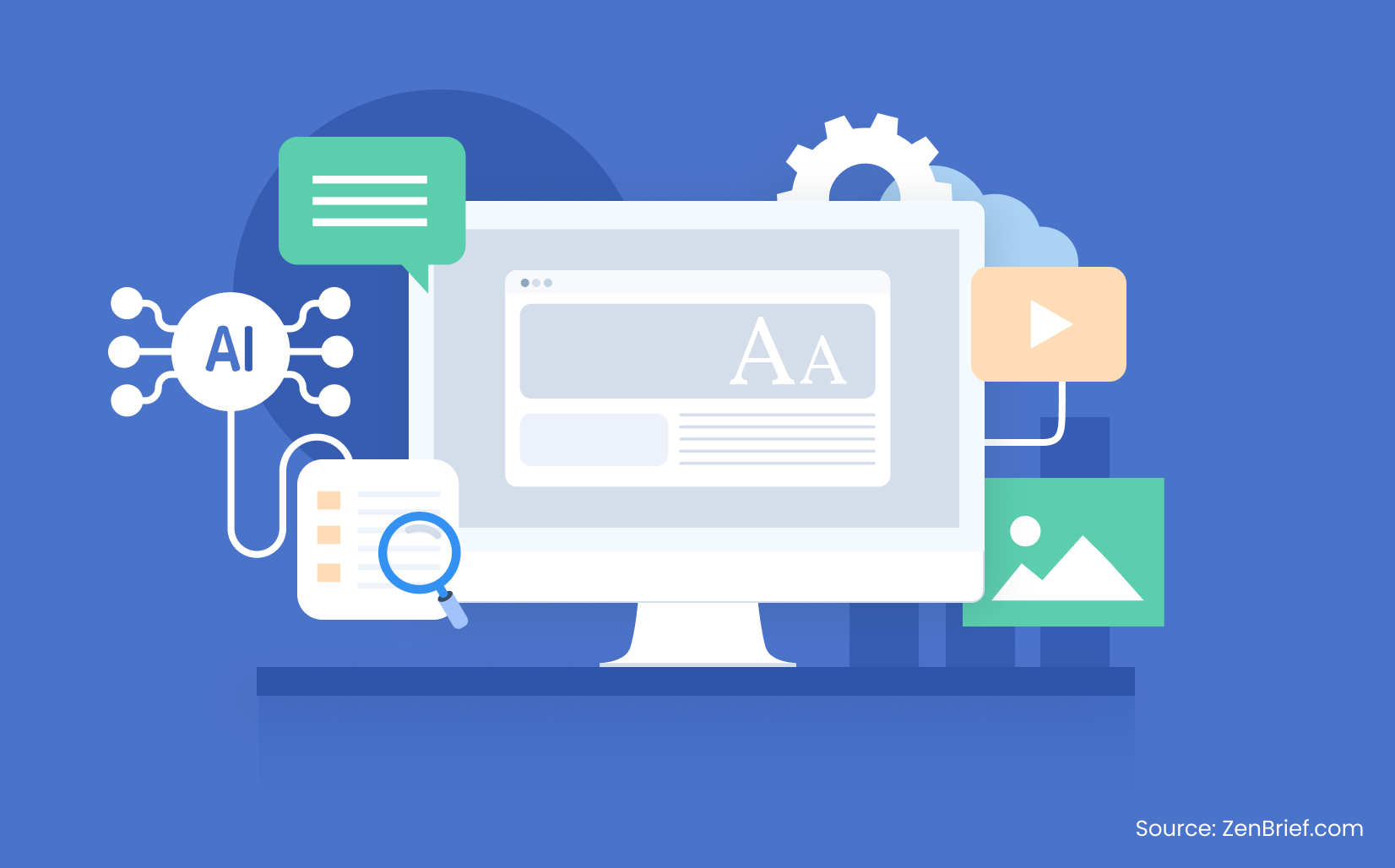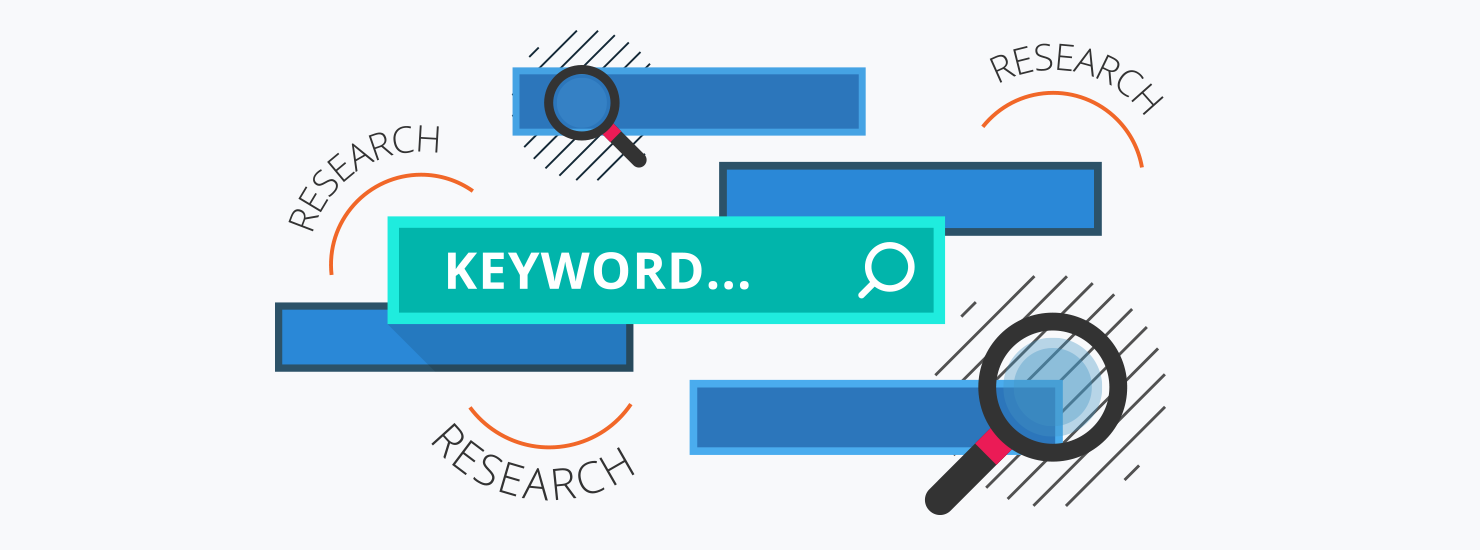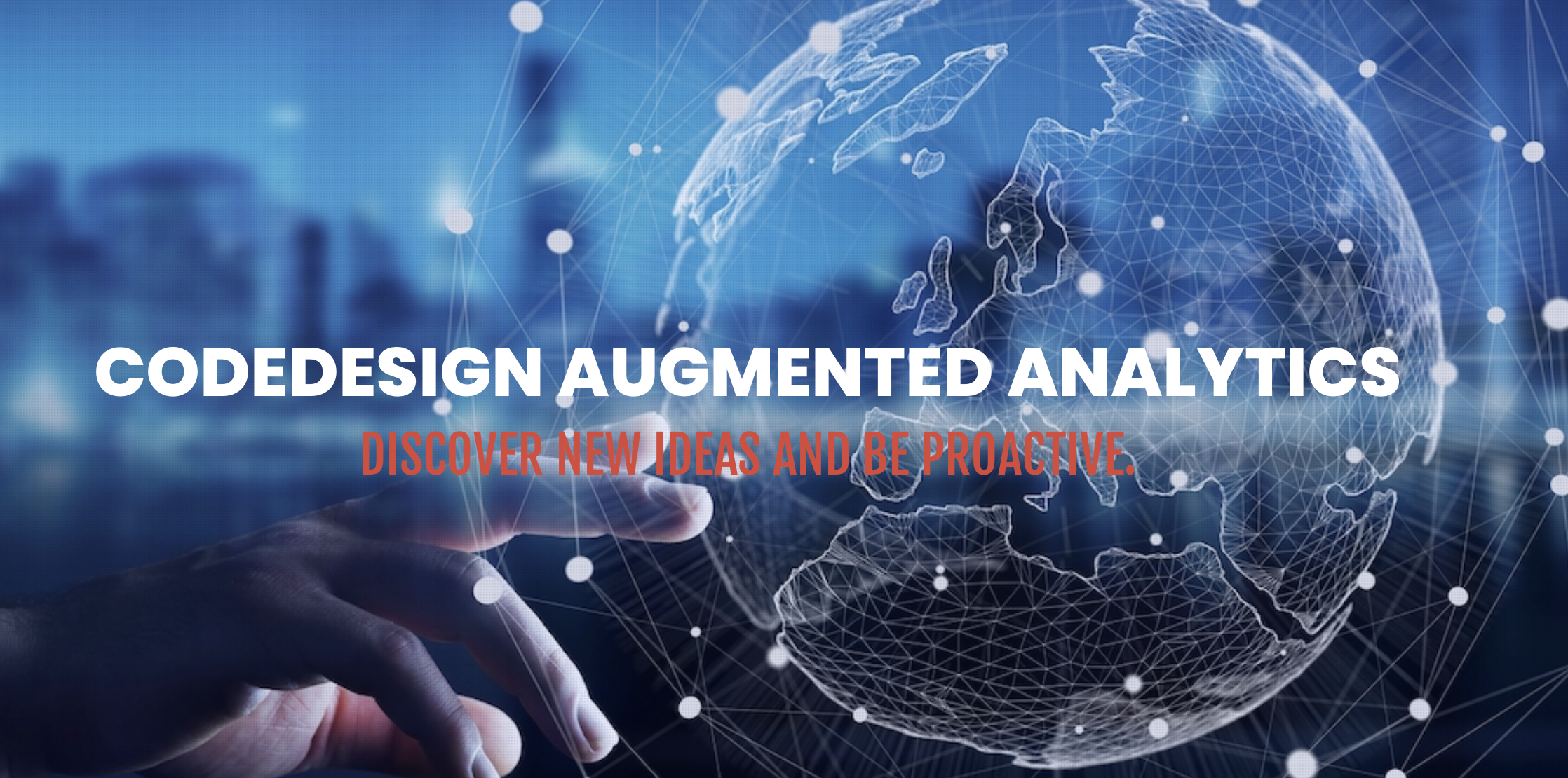12 min to read
AI and SEO: How do they go hand in hand?

With the rise of GPT models and their widespread popularity has brought about an immense debate on what is the future of SEO.
If we talk about ChatGPT, it has about 180.5 million users on the platform and has generated 1.5 billion visits in September 2023. That's great news for OpenAI and ChatGPT, isn’t it? But, on the other hand, many people take it as a sign that users could be possibly drifting away from Google search and then going to websites thereafter. But, is it really a threat to the entire SEO industry?
Talking about the present time, we are living in an age that is experiencing AI revolution, and we are yet to understand how certain things would go. For example, on one hand it is making certain things a lot faster for us, in terms of Ad copy generation or image generation, but on the other hand, it is also bringing forward the issue of overcomplicating the information-economy for many subject matter experts. Anyone could go to these language models and prompt it to be a subject matter in a field and then give its opinion on a topic.
But can it really be the game-changer for non-experts where they can outperform the real-experts in bringing forward the right opinion, information and strategies to perform something.
In my opinion, I am not convinced with this idea for certain reasons. Number one is that the language models are available for everybody and from what we have seen, the GPT models tend to be repetitive and bogus for non-generic topics.
For example, if we ask the GPT model to pretend to be a digital marketer, and lay out a strategy for an e-commerce fashion brand, it comes with a list of generic points. To make my point clear these points aren’t wrong in any way, but can a founder read these points and carve a successful campaign? Some obviously could, but it’s unlikely for most of the ones. On the other hand, if we read the guides and strategies, and examples of failed and successful less known case studies, we are more likely to have a grasp on how the campaign should run at all.
Also, even the most sophisticated model GPT 4.0 Turbo has its information limited to April 2023, which is again a challenge when trends and strategies go about in a month or so. At this moment, I’m not complaining about the lack of recent information, but I am simply trying to put forward my perspective on why we need subject matter experts and content driven by experience.
Just to clarify, the models can’t be up to date like Google search engines, because you need to train the models on vast amounts of data, and wait for it to generate results. And, then based on the feedback, the models optimize its results.
So, if you see the basic difference between the Google search engine and GPT models is that the search engines show your opinion, but GPT models try to fetch you answers based on its understanding about the subject-matter.
How does AI and SEO go together after all?
This would be a completely wrong narrative if we say AI has nothing to do with the SEO. From the very definition of the term AI, we deduce that it is meant to optimize the work and processes that only a human could do. It is meant to do things faster and in real time to save time, effort and resources. And the same is true for the SEO industry.
There are various applications of AI in SEO. Be it data analysis to understand the intent.
AI in content optimization

Google's Topic Layer, introduced in 2018, leverages AI to deeply understand topic spaces and their evolution over time. AI content tools adopt similar principles by analyzing web content for a given topic, identifying subtopics, and understanding how they relate to each other.
With the help of AI tools, you could analyze patterns within subtopics to intelligently surface content that users might want to explore next. This pattern recognition enhances the ability to present relevant and engaging content to the audience. Also, when we talk about the updates and guidelines that you get from Google, you could easily feed that information to your custom GPT and let the model analyze and see if there is any angle missing in the topic, or if you need to change the tone or address it in a better way.
Now, if we look at it from the user's perspective, this optimization is helping them in many ways. Firstly, it’s satisfying the search intent and the searcher gets the answer to the query in a better way. Secondly, they don't have to go to multiple long pages for a simple query that could be answered on spot.
Understand and analyze the real time keyword suggestions by Google

See, the present time is not about creating content around search engines with the hope of people clicking to your website, and making sales. Or in all honesty, has it ever been the case? No, right?
The purpose of search engines to exist in the first place is to help users navigate to the right authentic pages that serve their best interests. So, why do we even run a race of chasing keywords and obsessing around search engines.
In today’s time, it’s all about serving the searchers with the right set of information, product or services. And also with generative AI, gone are the days when random newbies used to give generic advice around a topic.
But, how does it present an option and opportunity for us?
People have been complaining about the low clicks that they are or they might get with the generative AI. But if we see the trend that has been happening for a long time, then ‘Featured snippets’, ‘Knowledge panels’, ‘People also asked’ have all already been employed so far so that people get answers to their generic questions on the spot. And, in the same trend, we are seeing generative AI helping answer the simple questions directly on search engines.
For most SEO strategists, now the bigger opportunity is with real time tracking the keyword suggestions that Google provides based on its model that predicts what the users could actually be looking for. Now with artificial intelligence, we can easily track what searchers are looking for and with the help of NLP models understand the context around the topic, and then write content that actually touches the pain point of the viewers.
Real time keyword rank tracking in any location
![]()
With the help of automation, your model could easily be tracking the real time search engine results page with the right VPNs and find which position your page would be ranking at. The AI model could utilize proxies to automate search queries. Proxies act as intermediaries between the AI system and the search engine, preventing IP blocks and ensuring a smooth, continuous flow of queries. This automation is crucial for tracking rankings in real-time efficiently.
This dynamic system must adapt to changing search algorithms through continuous learning, providing marketers with actionable insights. Whether rotating through VPNs, processing data, or generating alerts for anomalies, the AI model empowers businesses to make informed decisions and refine their SEO strategies for optimal results.
Marketers utilizing AI and NLP are the best bet to outgrow your competition

When we talk about the ever-evolving space of marketing and advertising, there is a lot of noise about how everything could be automated to an extent where the opinions of experts wouldn’t matter at all. But is it true?
AI could help with data visualization, context interpretation, understanding the trends and so forth. But, to ensure that all this information is used in a way that actually moves the shaft, we need experts at the forefront of this digital attention war.
With the help of AI, brands today could do a lot of things in real time which wasn’t possible anytime before.
Let’s talk about the process of understanding the customers.
Marketing experts could help you train models to process vast amounts of customer data, extracting meaningful insights into preferences, behaviors, and patterns that traditional methods might overlook. When we have sufficient data about what is working and what’s not, we have the option to conduct in-depth behavioral analysis, identifying trends and uncovering subtle nuances in customer interactions with products, services, and content.
Also, for the stores offering various products and services to their customers, real-time customer segmentation and offering the right products have become the new norm. For the e-commerce stores, this has become more important, as the model could generate personalized recommendations based on individual customer preferences, enhancing the relevance and effectiveness of marketing strategies.
For the longest time, customer segmentation has been the most important part of any marketing strategy but in the present landscape, AI ensures precise customer segmentation by categorizing individuals based on their unique characteristics and behaviors, allowing for more targeted and tailored marketing campaigns.
Why is CodeDesign the right choice for the AI digital attention war?

From my experience at CodeDesign, our Augmented Analytics tool is a game-changer in empowering marketers to achieve a comprehensive understanding of customer behavior and, consequently, optimize their strategies. We have developed our own augmented analytics model to help you with your marketing efforts.
Here's how our tool could assist:
Advanced Data Processing:
CodeDesign's Augmented Analytics employs advanced algorithms to process vast amounts of customer data swiftly and efficiently, extracting key insights that inform strategic decision-making.
Behavioral Analytics:
Our tool conducts detailed behavioral analysis, unraveling patterns and trends in customer interactions that might otherwise go unnoticed. This deeper insight allows for more nuanced and effective marketing strategies.
Personalization Capabilities:
With machine learning at its core, our model facilitates personalized marketing by generating recommendations tailored to individual customer preferences, enhancing the relevance and impact of campaigns.
Segmentation Precision:
Our Augmented Analytics ensures accurate customer segmentation, enabling marketers to target specific demographics with precision and deliver content that resonates with each audience segment.
Real-Time Insights:
There is no optimization without real time insights. Hence our tools provide you real-time insights into customer behaviors, allowing us to adapt strategies on the fly in response to changing trends, preferences, and market dynamics.
Predictive Analytics:
Our tool goes beyond hindsight by incorporating predictive modeling, helping marketers anticipate future customer actions and enabling proactive adjustments to stay ahead of the competition.
Sentiment Analysis:
Leveraging Natural Language Processing, our model enables sentiment analysis, providing valuable insights into customer attitudes and feelings gleaned from sources like reviews and social media comments.
Holistic Data Integration:
CodeDesign seamlessly integrates data from diverse channels, including websites and social media, offering a holistic view of customer behavior across multiple touchpoints for a more comprehensive understanding.
Customer Journey Mapping:
Our tool assists in mapping the entire customer journey, offering a detailed overview of critical touchpoints. This allows marketers to optimize strategies for maximum impact throughout the customer lifecycle.
Continuous Learning Mechanism:
The analytics algorithms continually evolve through exposure to new data, ensuring a continuous improvement in understanding customer behavior. This adaptability enables ongoing refinement of marketing strategies.
FAQs - Frequently Asked Questions
What role does AI play in modern SEO strategies?
AI has revolutionized modern SEO strategies by providing more sophisticated and efficient ways to optimize websites for search engines. It enables the analysis of large volumes of data quickly, helping to identify patterns, trends, and insights that were previously difficult or time-consuming to uncover. AI tools can automate repetitive tasks, such as site audits and keyword research, allowing SEO professionals to focus on strategy and content creation. Moreover, AI-powered algorithms used by search engines themselves are continually evolving, making it imperative for SEO strategies to adapt accordingly. AI facilitates a deeper understanding of user behavior, preferences, and search intent, enabling the creation of more targeted and relevant content, thus improving search engine rankings and user engagement.
Can AI tools help improve content optimization for SEO?
Absolutely, AI tools play a crucial role in enhancing content optimization for SEO. They can analyze top-performing content across the web to identify key characteristics that resonate with audiences and rank well in search engine results. By leveraging natural language processing (NLP) and machine learning, AI tools offer suggestions for optimal keyword usage, content structure, and readability improvements. This not only helps in crafting content that's more likely to rank higher but also in delivering a better user experience. AI-driven content optimization tools can provide real-time suggestions for enhancing content quality, relevance, and engagement, thereby significantly improving the efficacy of SEO efforts.
How does AI assist in analyzing and understanding user search intent?
AI assists in analyzing and understanding user search intent by employing sophisticated algorithms and natural language processing (NLP) techniques. These technologies enable the parsing of search queries beyond simple keywords to comprehend the context and nuances of what users are actually seeking. AI can categorize search intent into different types, such as informational, navigational, transactional, or commercial investigation. By understanding the underlying intent of searches, AI helps in tailoring content that directly answers user questions or provides them with the information or solutions they are searching for. This deeper insight into search intent allows for more effective content strategies that align with user needs, improving both SEO performance and user satisfaction.
What are the benefits of using AI for keyword research and analysis?
Using AI for keyword research and analysis offers several benefits, including efficiency, accuracy, and depth of insights. AI tools can process and analyze vast amounts of search data at scale, uncovering long-tail keywords and emerging trends that manual research might miss. These tools can also evaluate keyword competitiveness, search volume, and relevance more accurately, helping to prioritize efforts on keywords with the highest potential ROI. Additionally, AI-powered analysis provides deeper insights into search behaviors, enabling marketers to understand the context and intent behind keywords. This level of analysis helps in creating more targeted and effective SEO strategies that can drive better rankings and more organic traffic.
How can AI improve real-time keyword rank tracking?
AI can significantly enhance real-time keyword rank tracking by providing more accurate, granular, and timely insights into keyword performance across different search engines, devices, and geographies. It leverages machine learning to predict ranking fluctuations and identify patterns that may indicate opportunities or threats. AI-driven rank tracking tools can alert marketers to sudden changes in rankings, enabling them to react swiftly with optimizations or adjustments to their SEO strategies. Additionally, by analyzing vast datasets, AI can offer predictive insights on potential ranking improvements and the impact of specific SEO actions, allowing for more strategic decision-making and optimization efforts.
In what ways can marketers use AI and NLP to gain a competitive edge in SEO?
Marketers can use AI and NLP to gain a competitive edge in SEO by leveraging these technologies for enhanced content relevance, user experience, and insight generation. NLP allows for a better understanding and processing of human language, enabling the creation of content that more closely aligns with user intent and search queries. This can significantly improve content's visibility and rankings. AI-driven analytics can unearth strategic insights from search data, competitor analysis, and market trends, offering a clearer path to outperforming competitors. Furthermore, AI and NLP can automate and optimize various SEO tasks, such as keyword research, content optimization, and link building, making SEO efforts more efficient and effective.
How does generative AI impact the way SEO strategies are developed?
Generative AI impacts SEO strategy development by offering new ways to create content, generate ideas, and personalize user experiences. It can produce high-quality, relevant content at scale, addressing specific keywords or topics, which helps in filling content gaps and improving site authority. Generative AI can also suggest content structures and formats that are more likely to engage users and perform well in search engine rankings. Moreover, it enables the personalization of content for different audience segments, improving user engagement and satisfaction. This level of automation and personalization was previously unattainable at scale, allowing SEO strategies to be more dynamic, responsive, and tailored to specific goals and audiences.
How can AI help in creating more personalized content for users?
AI helps in creating more personalized content for users by analyzing data on user behavior, preferences, and interactions with websites and content. This analysis enables the identification of patterns and segments within the audience, allowing for the customization of content to meet the specific needs and interests of different user groups. AI can dynamically adjust content recommendations, personalize email marketing campaigns, or tailor website experiences to individual users, enhancing engagement and conversion rates. By delivering content that resonates on a personal level, AI significantly improves the effectiveness of content marketing strategies and drives better SEO outcomes through increased user satisfaction and loyalty.
What are the implications of AI on future SEO trends and practices?
The implications of AI on future SEO trends and practices are profound and multifaceted. As AI technology evolves, search engines will become even more efficient at understanding and ranking content that best satisfies user intent. This will necessitate a shift towards more natural, user-focused content creation and away from traditional keyword optimization strategies. AI will also drive the adoption of voice search and visual search optimization, as these technologies become more prevalent. Additionally, AI's ability to analyze and predict user behavior will lead to more personalized and predictive SEO strategies. Overall, AI will make SEO more dynamic, with a greater emphasis on quality, relevance, and user experience.
How does CodeDesign utilize AI to enhance its digital marketing services?
CodeDesign utilizes AI to enhance its digital marketing services by leveraging cutting-edge technologies to optimize campaigns, personalize user experiences, and drive better ROI for clients. AI-driven analytics and insights help in understanding audience behavior and preferences, enabling more targeted and effective marketing strategies. For SEO, CodeDesign uses AI tools for keyword research, content optimization, and real-time performance tracking, ensuring clients' websites rank highly and attract quality traffic. AI is also used in programmatic advertising to automate ad buying, optimize ad placements, and dynamically adjust bidding strategies based on performance data. By harnessing the power of AI, CodeDesign delivers innovative, data-driven digital marketing solutions that keep clients ahead in a rapidly evolving digital landscape.

About Bruno GavinoBruno Gavino is the CEO and partner of Codedesign, a digital marketing agency with a strong international presence. Based in Lisbon, Portugal, with offices in Boston, Singapore, and Manchester (UK) Codedesign has been recognized as one of the top interactive agencies and eCommerce agencies. Awarded Top B2B Company in Europe and Top B2C company in retail, Codedesign aims to foster personal relationships with clients and create a positive work environment for its team. He emphasizes the need for digital agencies to focus on data optimization and performance to meet the increasingly results-driven demands of clients. His experience in digital marketing, combined with a unique background that includes engineering and data, contributes to his effective and multifaceted leadership style. |

About CodedesignCodedesign is a digital marketing agency with a strong multicultural and international presence, offering expert services in digital marketing. Our digital agency in Lisbon, Boston, and Manchester enables us to provide market-ready strategies that suit a wide range of clients across the globe (both B2B and B2C). We specialize in creating impactful online experiences, focusing on making your digital presence strong and efficient. Our approach is straightforward and effective, ensuring that every client receives a personalized service that truly meets their needs. Our digital agency is committed to using the latest data and technology to help your business stand out. Whether you're looking to increase your online visibility, connect better with your audience, get more leads, or grow your online sales. For more information, read our Digital Strategy Blog or to start your journey with us, please feel free to contact us. |
CodeDesign is leading:
- Digital Agency
- Digital Marketing Agency
- Digital Ecommerce Agency
- Amazon Marketing Agency

Add comment ×